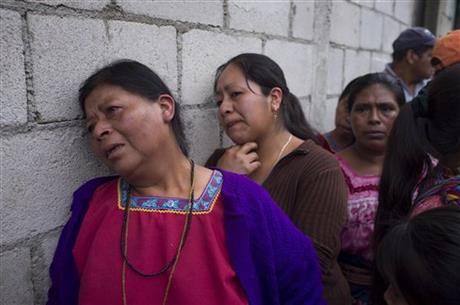
By SONIA PEREZ D.
Relatives of victims react as police take away the bodies, not seen, after an attack in San Jose Nacahuil, on the outskirts of Guatemala City, Sunday, Sept. 8, 2013. Men firing from a car poured gunshots into three cantinas in this rural town, killing at least 10 people and injuring 19, local firefighters said Sunday. (AP Photo/Moises Castillo)SAN JOSE NACAHUIL, Guatemala (AP) — A group of men in a stolen car shot 29 people on the main street of a poor indigenous town in the mountains outside Guatemala City, killing 11 in an incident that some residents blamed on corrupt police officers.
Officials blamed the attack on gang violence but that was greeted with skepticism by some residents of San Jose Nacahuil. Residents expelled the national police six years ago and set up a community police force that patrols with sticks and machetes, and officials said the community had low crime rates in recent years.
Eight of the dead were shot in a just-opened cantina, a one-story cinderblock building where men were drinking beer and liquor around plastic tables. The majority of the wounded were shot in the street between the cantina and a second, older bar owned by the same local businessman. Two of those shot in the street died, along with a man shot in the second cantina.
Interior Minister Mauricio Lopez Bonilla said the National Civil Police sent a patrol car to the town Saturday night after receiving an anonymous call reporting fears of an imminent attack. Officers “determined that everything was OK and the patrol car left,” he said. “One hour later, the attack happened.”
A relative of the cantina owner, who spoke on condition of anonymity for fear of official retaliation, said the owner reported that the police arrived without warning, said they were checking the permits for the new cantina and demanded a $60 bribe to approve them. When the man refused, the police told him to get all minors out of the bar and left, the relative said.
“He came home, said the police had come to ask for the papers and asked him for 500 quetzales. Then when he didn’t give it to them, they told him not to sell liquor to minors and get them out of the bar,” the relative said. “Soon afterward I heard the shots. It seems like he hid in the bathroom and they killed him there.”
Regional police spokesman Jorge Aguilar suggested the attackers may have been gang members who tried to buy liquor in the bars but were refused. Many townspeople said they didn’t believe that.
“We think the patrol car had something to do with it, because they showed up and 20 minutes after they left there was the attack,” said Santos Peinado, a 28-year-old constructions worker whose cousin, Santos Suret, was killed. “Why didn’t they stay and why didn’t they arrest the attackers?”
The Kaqchikel Maya town of about 7,500 people sits 11 miles (18 kilometers) northeast of Guatemala City, but takes more than an hour to reach because it is accessible by a single dirt road. Many of its men work temporary constructions jobs in the city, and the town has virtually no running water or indoor plumbing.
Lopez Bonilla noted the town has had a troubled history with police, with none stationed there because villagers burned down the police station several years ago. Residents said the incident erupted after the police falsely accused local men of kidnapping.
Lopez Bonilla called the town “a very well organized community” with a very low crime rate, despite the violence that plagues Guatemala City and the drug-gang clashes that have led to mass murders in some other parts of the country.
Mexico’s Zetas drug gang has seized control of large swaths of territory along Guatemala’s northern border, where it is blamed for large-scale violence including the massacre of 27 farm workers in 2011. Drug cartels have far less presence in the area of Saturday’s shooting, though residents said there is also some gang presence in nearby towns, mostly of small local groups that engage in robbery and extortion.
The National Police still operate in those towns along the same dirt road. Across the country, the police force has been frequently accused of corruption, extortion and links to local gangs.



